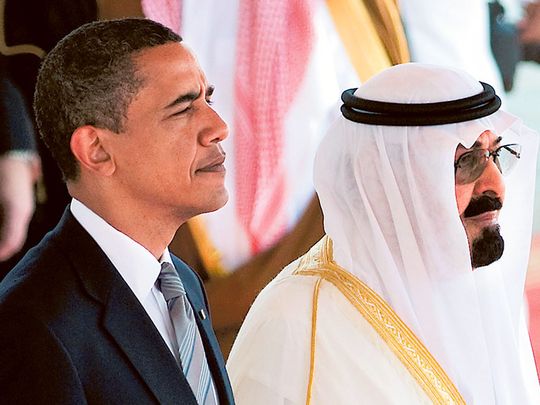
Riyadh: World leaders headed to Saudi Arabia Saturday to offer condolences following the death of King Abdullah, with US President Barack Obama cutting short a trip to India to pay respects.
Obama had been scheduled to visit the Taj Mahal but cancelled that following the death of Abdullah and will travel to Riyadh on Tuesday to meet new King Salman, the White House said.
Since Abdullah took the throne in 2005, Saudi Arabia has been a prime Arab ally of Washington, and last year joined the coalition carrying out air strikes against Daesh.
Other dignitaries arrived in Riyadh on Saturday to pay respects, including Iranian Foreign Minister Mohammad Javad Zarif, on a rare visit to the regional rival.
British Prime Minister David Cameron, Prince Charles and French President Francois Hollande were among other leaders expected to fly in to offer condolences.
Abdullah was a cautious reformer who led the Gulf state through a turbulent decade in a region shaken by the Arab Spring uprisings and Islamist extremism.
He died on Friday at the age of about 90 after being hospitalised with pneumonia.
World leaders have praised the king as a key mediator between Muslims and the West, but campaigners criticised his rights record and urged Salman to do more to protect freedom of speech and women’s rights.
Gulf rulers, and leaders including Turkish President Recep Tayyip Erdogan and Pakistani Prime Minister Nawaz Sharif, were among those who attended Abdullah’s traditionally simple funeral at Riyadh’s Imam Turki Bin Abdullah mosque on Friday.
Africa was also represented, with Sudanese President Omar Al Bashir and Ethiopian Prime Minister Hailemariam Desalegn.
President Ali Bongo Ondimba of Gabon and other leaders from the continent arrived on Saturday to pay respects.
On Friday the late king’s body, wrapped in a cream-coloured shroud, was borne on a litter by members of the royal family wearing red-and-white checked headgear.
The body was quickly moved to nearby Al Od public cemetery and buried, in a grave marked only by a book-sized plain grey stone.
Palestinian President Mahmud Abbas and Malaysia’s Prime Minister Najib Razak arrived later to deliver condolences, as did Iraqi President Fuad Massoum.
Masum had met with Abdullah last November, helping to repair long-strained relations between the neighbours.
On Friday evening hundreds of Saudis queued to enter a royal palace where they rubbed cheeks and kissed the hands of their new leaders, in a symbolic pledge of allegiance.
Mourning ceremonies were planned for Saturday and Sunday evenings at another palace, official media said.
Obama paid tribute to Abdullah as a “valued” ally as the State Department indicated cooperation between Washington and Riyadh would continue.
Wary of the rising influence of Islamist movements, Saudi Arabia has been a generous supporter of Egyptian leader Abdul Fattah Al Sissi since the army ousted Mohammad Mursi of the Muslim Brotherhood.
Egypt declared seven days of official mourning for Abdullah, and sent its prime minister to the funeral.
Riyadh has also played a key role in supporting opposition to Iranian-backed President Bashar Al Assad of Syria, and will allow US troops to use its territory to train rebel fighters.










